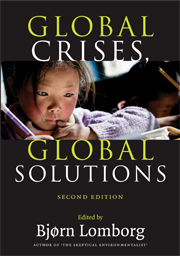Book contents
- Frontmatter
- Contents
- List of figures
- List of tables
- List of contributors
- Acknowledgements
- List of abbreviations and acronyms
- Introduction
- PART I THE CHALLENGES
- 1 Air pollution
- 2 The security challenge in conflict-prone countries
- 3 Disease control
- 4 The benefits and costs of alternative strategies to improve educational outcomes
- 5 Climate change
- 6 Hunger and malnutrition
- 7 Water and sanitation
- 8 The challenge of reducing international trade and migration barriers
- 9 Transnational terrorism
- 10 Women and development
- PART II RANKING THE OPPORTUNITIES
- Conclusion
3 - Disease control
Published online by Cambridge University Press: 05 June 2012
- Frontmatter
- Contents
- List of figures
- List of tables
- List of contributors
- Acknowledgements
- List of abbreviations and acronyms
- Introduction
- PART I THE CHALLENGES
- 1 Air pollution
- 2 The security challenge in conflict-prone countries
- 3 Disease control
- 4 The benefits and costs of alternative strategies to improve educational outcomes
- 5 Climate change
- 6 Hunger and malnutrition
- 7 Water and sanitation
- 8 The challenge of reducing international trade and migration barriers
- 9 Transnational terrorism
- 10 Women and development
- PART II RANKING THE OPPORTUNITIES
- Conclusion
Summary
Introduction
This Challenge paper identifies priorities for disease control as an input into the 2008 Copenhagen Consensus project (hereafter, CC08). As such, it updates the evidence and differs somewhat in its conclusions from the communicable disease paper (Mills and Shilcutt 2004) prepared for the 2004 Copenhagen Consensus, which Lomborg (2006) summarizes.
Our analysis builds on the results of the Disease Control Priorities Project (DCPP). The DCPP engaged over 350 authors and among its outputs were estimates of the cost-effectiveness of 315 interventions. These estimates vary a good deal in their thoroughness and in the extent to which they provide region-specific estimates of both cost and effectiveness. Taken as a whole, however, they represent a comprehensive canvas of disease control opportunities. Some interventions are clearly low priority. Others are attractive and worth doing, but either address only a relatively small proportion of disease burden or are simply not quite as attractive as a few key interventions. This chapter identifies seven priority interventions in terms of their cost-effectiveness, the size of the disease burden they address, and other criteria. Separate but related papers for CC08 deal with malnutrition (Horton et al. 2008, see chapter 6 in this volume), with water and sanitation (Hutton 2007), with air pollution (Larsen et al. 2008, see chapter 1 in this volume), and with education (Orazem et al., 2008, see chapter 4 in this volume).
- Type
- Chapter
- Information
- Global Crises, Global SolutionsCosts and Benefits, pp. 126 - 179Publisher: Cambridge University PressPrint publication year: 2009
- 3
- Cited by



